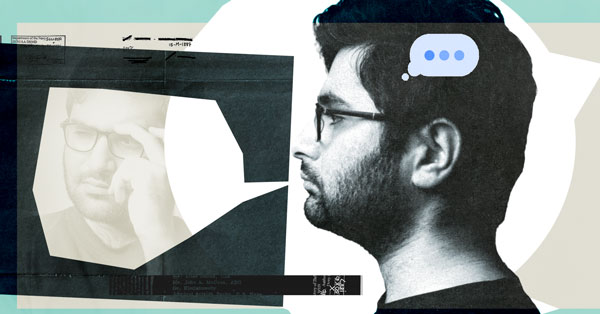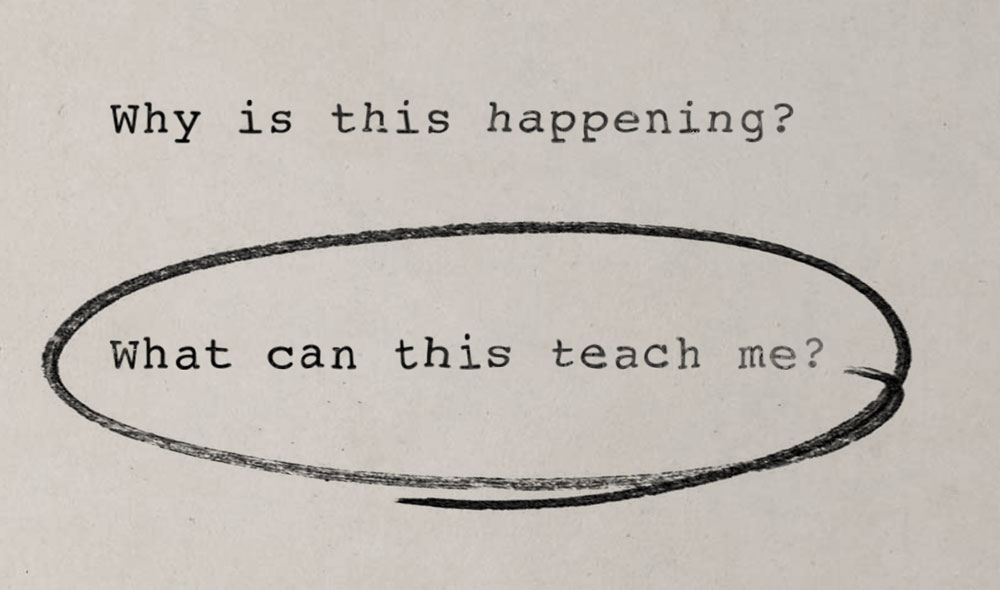
A few tiny words can make a huge difference.
Your self-talk determines your self-image – both in a good and bad way.
Can you feel the difference between “I’m a loser” and “I made a mistake?”
The wrong language puts you in bad lighting, often subconsciously. No man wants to talk himself down, but it’s hard to break with old patterns. Every time you go through them, it reinforces the loop. The results are not conducive at best and self-sabotaging at worst.
- Anxiety
- Worries
- Feelings of inferiority
- Low self-esteem
- Staying below your potential
They have a devastating impact on your relationships, career, and personal discipline.
However, the right language can get you out of the negative thought loops and self-sabotaging patterns.
In Cognitive Behavioral Therapy, you change the perspective from which you look at yourself or a situation.
This creates powerful mindset shifts – from being the victim to taking control, from self-blame to learning from mistakes, and from complaints to gratitude.
And it can all be done with a few simple changes in how you talk to yourself.
How To Take Off the Pressure and Replace Obligation With Opportunity
You won’t like to hear this, but you create all your stress, anxiety, and pressure in your head.
Situations are just situations, black and white lines forming shapes. Your interpretation puts the colors onto the canvas. You decide which ones.

When you stress yourself out because your boss gives you a tight deadline or you’ve got a trip to your notoriously negative in-laws coming up, you put an emotional stamp on it.
Often, you tell yourself you should do something, or perform a certain way.
- “I should put in extra hours so I can meet my boss’s demands.”
- “I should show my best side when visiting her parents.”
- “I should lose a few pounds for the summer.”
These should-statements contribute to feelings of fear and worry because they create demand and pressure.
But if you change the stamp you put onto a situation, you’ll change your feelings towards it.
Instead of saying “I should,” try “I could.”
This puts you in control. There’s no external force dictating what to do and how to behave. You can decide for yourself – by consulting your values, feelings, and rational mind.
Instead of pressuring yourself, you’ll realize the opportunity.
- “I could show my boss I’m dedicated and earn some brownie points for my next raise.”
- “I could show my in-laws what a great man her daughter has married.”
- “I could look fantastic and make some heads turn at the beach this year.”
Sometimes, you need a little nudge to get off the couch.
But too much pressure creates anxiety, worries, and fear – paralyzing you like a deer in headlights.
Don’t stress yourself out – instead, look at the amazing opportunities you have.
Drop the resistance and you’ll pick up the inspiration.

Don’t Keep Yourself Stuck
“Whether you believe you can do a thing or not, you are right.” – Henry Ford
What do a crazy gym workout in blistering heat, working extra hours for your side hustle, and spending time with your loved ones even though you’re crazy busy have in common?
It’s easy to say, “I can’t.”
I get it. Sometimes, it seems like there’s no way out, so your response is no can do. But you’re cutting yourself short.
Saying “I can’t” leads to frustration, anger, and resentment towards the situation. It focuses your brain on the problem.
Asking yourself “How can I?” instead leads to hope, inspiration, and a feeling of power. It focuses your brain on the solutions.
When I pondered quitting my studies to start my own business, I first thought that I can’t just fuck off, do my own thing, and live on the beach. Society had conditioned me to believe that it wasn’t possible.
But one day, I started asking myself “how can I?” – and step by step, I found solutions to my problems.
What you can and can’t do is often a matter of perspective.
Don’t focus on the problem.
Focus on the solutions.
Where focus goes, energy flows.
When Things Go Wrong, Ask The Right Question
You can’t change the ups and downs of life, but you can change how you deal with them.
A sickness that befalls you or a loved one. A budget cut at your company that puts you out of work. A car runs a red light and sends you flying like a frisbee.
There are two ways to deal with this:
You can either take the victim role and complain – “why is this happening to me?”
Or, you can take responsibility and learn the lesson – “what can this teach me?”
One makes you powerless, the other puts you in charge.
Every messed-up situation I’ve ever gone through was good for something. Heart-wrecking breakups, a failed business, and painful gym injuries all taught me valuable lessons and turned me into the man I am today.

Life will never stop challenging you.
As David Deida put it:
“As long as life continues, the creative challenge is to tussle, play, and make love with the present moment.”
Now, what can life teach you?
“Watch your thoughts, they become your words; watch your words, they become your actions; watch your actions, they become your habits; watch your habits, they become your character; watch your character, it becomes your destiny.” – Lao Tzu